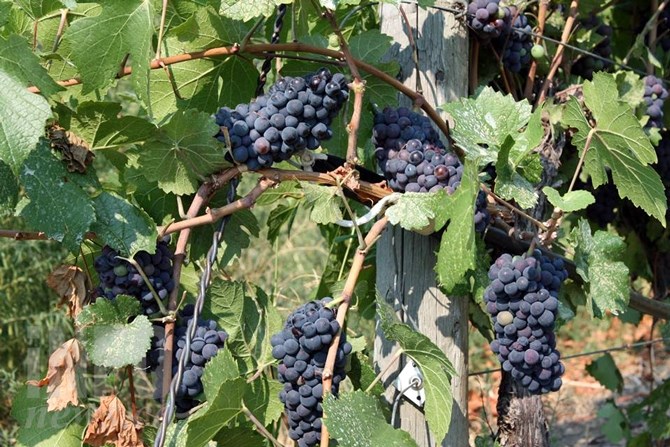Grapes tainted by smoke is real for Okanagan wineries but a solution offers hope

The question comes up for local wineries during every bad wildfire season but few winemakers will readily admit that yes, wildfire smoke can impact grapes.
While several winemakers have confirmed the problem privately, they don’t like to discuss it publicly though now that the problem appears to have been solved by UBC Okanagan scientists, that may change.
A recent study by UBCO researchers led to the development of a preventative strategy for protecting grapes from volatile phenols — flavoured compounds present in smoke that may be absorbed into ripening grapes and subsequently impact wine flavour.
Chemistry professor Wesley Zandberg and his team tested multiple substances and found that applying an agricultural spray composed of phospholipids — typically used to prevent cracking in cherries — to wine grapes one week before exposing them to simulated forest fire smoke significantly reduced the levels of volatile phenols measured in smoke-exposed grapes at commercial maturity.
One winemaker we spoke to said he could see widespread use of the spray in the Okanagan.
Zandberg said for the study he worked with three Kelowna wineries whose grapes were impacted by smoke taint in 2018.
He said roughly 12 wines from the wineries couldn’t be used that year due to the taint, while a few others were marketed with a light smoky flavour.
The next stages will be to determine exactly how much smoke is required to impact the grapes and while chemists know the chemical compound that creates the smoky flavour, they still have to make wine from tainted grapes to determine how much it impacts the flavour, Zandberg said.
They’re also working with wineries in Australia to develop a standardized method to determine smoke taint, he said.
Zandberg said the spray is not certified organic, which would impact a wine’s organic label.
Howard Soon, winemaker at Vanessa Vineyard in Cawston, is cautiously optimistic about the spray.
The taint is less drastic on white wine than red, he said, adding that it also depends on how long the smoke is hanging over the grapes.
“What if the spray does something else… I don’t mistrust his work, I just can’t get excited and jump on it yet,” Soon said.
Wineries haven't been able to remove the smoke taste out of the wine, he said, but they are able to work with a small amount of tainted grapes.
“It’s not fun, but the best thing about smoke taint is (the smoke) seems to come and go,” Soon said. “The taste of it is like licking the bottom of an ash tray.”
He said his vineyard’s grapes haven’t been affected by smoke yet, but he sees the problem persisting in the future.
Strategies to prevent forest fires should be prioritized first, he said, and listed B.C. fuel mitigation programs which remove flammable debris from the forest floor as an example.
To contact a reporter for this story, email Carli Berry or call 250-864-7494 or email the editor. You can also submit photos, videos or news tips to the newsroom and be entered to win a monthly prize draw.
We welcome your comments and opinions on our stories but play nice. We won't censor or delete comments unless they contain off-topic statements or links, unnecessary vulgarity, false facts, spam or obviously fake profiles. If you have any concerns about what you see in comments, email the editor in the link above.


